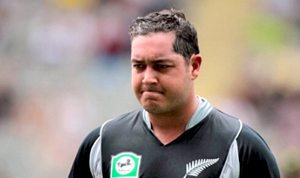 Wellington, Feb 10: Facing investigation for a scuffle at an Auckland bar, New Zealand's temperamental batsman Jesse Ryder and medium-pacer Doug Bracewell will not be considered for the second cricket Test against India starting here on February 14.
Wellington, Feb 10: Facing investigation for a scuffle at an Auckland bar, New Zealand's temperamental batsman Jesse Ryder and medium-pacer Doug Bracewell will not be considered for the second cricket Test against India starting here on February 14.
The two players got injured after a physical altercation with each other at an Auckland bar before the Test first against India which the home team won by 40 runs yesterday.
Both have reportedly admitted to being at the scene of incident.
Ryder, who has a history of alcohol-related misdemeanours, and Bracewell are currently being investigated for the brawl.
"We'll be naming our second Test side tomorrow or maybe later on today and neither Jesse Ryder nor Doug Bracewell will be available for selection," New Zealand coach Mike Hesson said.
Bracewell suffered a broken foot, while Ryder also reportedly hurt his hand during the scuffle, the reasons for which are not yet known.
Neither of them was part of the first Test's playing XI but were there as cover for any possible injury breakdowns.
"There's an investigation taking place and we'll let that run its course before making any bold statements about that sort of thing. Once we get the full information and facts, we'll be in a far better position to make a statement. It's important we don't jump to conclusions without getting the full facts," Hesson said.
"We need to make sure all our players prepare themselves accordingly for Test cricket and at the moment we don't have confidence that that's the case," he added.
Hesson said the two players have his trust but he would wait for an enquiry to establish the exact sequence of events that night.
"We have faith in our players that they make good decisions around their preparation. We're dealing with grown men so if a player was to have a beer with their meal before a game we don't have an issue with that at all.
"These are grown men who can make decisions. There's a bit difference between that and what occurred the night before the Test," he said.
This is not the first time that Ryder and Bracewell find themselves at the centre of a controversy like this. In 2012, both were axed from the ODI team for breaching the team's code of conduct.
Ryder, in fact, has a very chequered past, having taken a break from international cricket before coming back last year. The comeback didn't go too well as he battled life-threatening injuries after another drunken brawl outside a bar.
In August last year, Ryder was slapped with a retrospective six-month ban for failing a routine drug test in domestic cricket.




Comments
Add new comment